- Home
- D. H. Lawrence
Sons and Lovers (Barnes & Noble Classics Series) Page 17
Sons and Lovers (Barnes & Noble Classics Series) Read online
Page 17
Mrs. Morel clung now to Paul. He was quiet and not brilliant. But still he stuck to his painting, and still he stuck to his mother. Everything he did was for her. She waited for his coming home in the evening, and then she unburdened herself of all she had pondered, or of all that had occurred to her during the day. He sat and listened with earnestness. The two shared lives.
William was engaged now to his brunette, and had bought her an engagement ring that cost eight guineas. The children gasped at such a fabulous price.
“Eight guineas!” said Morel. “More fool him! If he’d gen me some on‘t, it ’ud ha’ looked better on ’im.”
“Given you some of it!” cried Mrs. Morel. “Why give you some of it!”
She remembered be had bought no engagement ring at all, and she preferred William, who was not mean, if he were foolish. But now the young man talked only of the dances to which he went with his betrothed, and the different resplendent clothes she wore; or he told his mother with glee how they went to the theatre like great swells.
He wanted to bring the girl home. Mrs. Morel said she should come at the Christmas. This time William arrived with a lady, but with no presents. Mrs. Morel had prepared supper. Hearing footsteps, she rose and went to the door. William entered.
“Hello, mother!” He kissed her hastily, then stood aside to present a tall, handsome girl, who was wearing a costume of fine black-and-white check, and furs.
“Here’s Gyp!”
Miss Western held out her hand and showed her teeth in a small smile.
“Oh, how do you do, Mrs. Morel!” she exclaimed.
“I am afraid you will be hungry,” said Mrs. Morel.
“Oh no, we had dinner in the train. Have you got my gloves, Chubby?”
William Morel, big and raw-boned, looked at her quickly.
“How should I?” he said.
“Then I’ve lost them. Don’t be cross with me.”
A frown went over his face, but he said nothing. She glanced round the kitchen. It was small and curious to her, with its glittering kissing-bunch, its evergreens behind the pictures, its wooden chairs and little deal table. At that moment Morel came in.
“Hello, dad!”
“Hello, my son! Tha’s let oncr me!”
The two shook hands, and William presented the lady. She gave the same smile that showed her teeth.
“How do you do, Mr. Morel?”
Morel bowed obsequiously.
“I’m very well, and I hope so are you. You must make yourself very welcome.”
“Oh, thank you,” she replied, rather amused.
“You will like to go upstairs,” said Mrs. Morel.
“If you don’t mind; but not if it is any trouble to you.”
“It is no trouble. Annie will take you. Walter, carry up this box.”
“And don’t be an hour dressing yourself up,” said William to his betrothed.
Annie took a brass candlestick, and, too shy almost to speak, preceded the young lady to the front bedroom, which Mr. and Mrs. Morel had vacated for her. It, too, was small and cold by candlelight. The colliers’ wives only lit fires in bedrooms in case of extreme illness.
“Shall I unstrap the box?” asked Annie.
“Oh, thank you very much!”
Annie played the part of maid, then went downstairs for hot water.
“I think she’s rather tired, mother,” said William. “It’s a beastly journey, and we had such a rush.”
“Is there anything I can give her?” asked Mrs. Morel.
“Oh no, she’ll be all right.”
But there was a chill in the atmosphere. After half an hour Miss Western came down, having put on a purplish-coloured dress, very fine for the collier’s kitchen.
“I told you you’d no need to change,” said William to her.
“Oh, Chubby!” Then she turned with that sweetish smile to Mrs. Morel. “Don’t you think he’s always grumbling, Mrs. Morel?”
“Is he?” said Mrs. Morel. “That’s not very nice of him.”
“It isn’t, really!”
“You are cold,” said the mother. “Won’t you come near the fire?”
Morel jumped out of his arm-chair.
“Come and sit you here!” he cried. “Come and sit you here!”
“No, dad, keep your own chair. Sit on the sofa, Gyp,” said William.
“No, no!” cried Morel. “This cheer’s warmest. Come and sit here, Miss Wesson.”
“Thank you so much,” said the girl, seating herself in the collier’s arm-chair, the place of honour. She shivered, feeling the warmth of the kitchen penetrate her.
“Fetch me a hanky, Chubby dear!” she said, putting up her mouth to him, and using the same intimate tone as if they were alone; which made the rest of the family feel as if they ought not to be present. The young lady evidently did not realise them as people: they were creatures to her for the present. William winced.
In such a household, in Streatham, Miss Western would have been a lady condescending to her inferiors. These people were to her, certainly clownish—in short, the working classes. How was she to adjust herself?
“I’ll go,” said Annie.
Miss Western took no notice, as if a servant had spoken. But when the girl came downstairs again with the handkerchief, she said: “Oh, thank you!” in a gracious way.
She sat and talked about the dinner on the train, which had been so poor; about London, about dances. She was really very nervous, and chattered from fear. Morel sat all the time smoking his thick twist tobacco, watching her, and listening to her glib London speech, as he puffed. Mrs. Morel, dressed up in her best black silk blouse, answered quietly and rather briefly. The three children sat round in silence and admiration. Miss Western was the princess. Everything of the best was got out for her: the best cups, the best spoons, the best table cloth, the best coffee-jug. The children thought she must find it quite grand. She felt strange, not able to realise the people, not knowing how to treat them. William joked, and was slightly uncomfortable.
At about ten o’clock he said to her:
“Aren’t you tired, Gyp?”
“Rather, Chubby,” she answered, at once in the intimate tones and putting her head slightly on one side.
“I’ll light her the candle, mother,” he said.
“Very well,” replied the mother.
Miss Western stood up, held out her hand to Mrs. Morel.
“Good-night, Mrs. Morel,” she said.
Paul sat at the boiler, letting the water run from the tap to a stone beer-bottle. Annie swathed the bottle in an old flannel pit-singlet, and kissed her mother good-night. She was to share the room with the lady, because the house was full.
“You wait a minute,” said Mrs. Morel to Annie. And Annie sat nursing the hot-water bottle. Miss Western shook hands all round, to everybody’s discomfort, and took her departure, preceded by William. In five minutes he was downstairs again. His heart was rather sore; he did not know why. He talked very little till everybody had gone to bed, but himself and his mother. Then he stood with his legs apart, in his old attitude on the hearth-rug, and said hesitatingly:
“Well, mother?”
“Well, my son?”
She sat in the rocking-chair, feeling somehow hurt and humiliated, for his sake.
“Do you like her?”
“Yes,” came the slow answer.
“She’s shy yet, mother. She’s not used to it. It’s different from her aunt’s house, you know.”
“Of course it is, my boy; and she must find it difficult.”
“She does.” Then he frowned swiftly. “If only she wouldn’t put on her blessed airs!”
“It’s only her first awkwardness, my boy. She’ll be all right.”
“That’s it, mother,” he replied gratefully. But his brow was gloomy. “You know, she’s not like you, mother. She’s not serious, and she can’t think.”
“She’s young, my boy.”
“Yes; and she’s had n
o sort of show. Her mother died when she was a child. Since then she’s lived with her aunt, whom she can’t bear. And her father was a rake. She’s had no love.”
“No! Well, you must make up to her.”
“And so—you have to forgive her a lot of things.”
“What do you have to forgive her, my boy?”
“I dunno. When she seems shallow, you have to remember she’s never had anybody to bring her deeper side out. And she’s fearfully fond of me.”
“Anybody can see that.”
“But you know, mother—she’s—she’s different from us. Those sort of people, like those she lives amongst, they don’t seem to have the same principles.”
“You mustn’t judge too hastily,” said Mrs. Morel.
But he seemed uneasy within himself.
In the morning, however, he was up singing and larking round the house.
“Hello!” he called, sitting on the stairs. “Are you getting up?”
“Yes,” her voice called faintly.
“Merry Christmas!” he shouted to her.
Her laugh, pretty and tinkling, was heard in the bedroom. She did not come down in half an hour.
“Was she really getting up when she said she was?” he asked of Annie.
“Yes, she was,” replied Annie.
He waited a while, then went to the stairs again.
“Happy New Year,” he called.
“Thank you, Chubby dear!” came the laughing voice, far away.
“Buck up!” he implored.
It was nearly an hour, and still he was waiting for her. Morel, who always rose before six, looked at the clock.
“Well, it’s a winder!” he exclaimed.
The family had breakfasted, all but William. He went to the foot of the stairs.
“Shall I have to send you an Easter egg up there?” he called, rather crossly. She only laughed. The family expected, after that time of preparation, something like magic. At last she came, looking very nice in a blouse and skirt.
“Have you really been all this time getting ready?” he asked.
“Chubby dear! That question is not permitted, is it, Mrs. Morel?” She played the grand lady at first. When she went with William to chapel, he in his frock-coat and silk hat, she in her furs and London-made costume, Paul and Arthur and Annie expected everybody to bow to the ground in admiration. And Morel, standing in his Sunday suit at the end of the road, watching the gallant pair go, felt he was the father of princes and princesses.
And yet she was not so grand. For a year now she had been a sort of secretary or clerk in a London office. But while she was with the Morels she queened it. She sat and let Annie or Paul wait on her as if they were her servants. She treated Mrs. Morel with a certain glibness and Morel with patronage. But after a day or so she began to change her tune.
William always wanted Paul or Annie to go along with them on their walks. It was so much more interesting. And Paul really did admire “Gipsy” whole-heartedly; in fact, his mother scarcely forgave the boy for the adulation with which he treated the girl.
On the second day, when Lily said: “Oh, Annie, do you know where I left my muff?” William replied:
“You know it is in your bedroom. Why do you ask Annie?”
And Lily went upstairs with a cross, shut mouth. But it angered the young man that she made a servant of his sister.
On the third evening William and Lily were sitting together in the parlour by the fire in the dark. At a quarter to eleven Mrs. Morel was heard raking the fire. William came out to the kitchen, followed by his beloved.
“Is it as late as that, mother?” he said. She had been sitting alone.
“It is not late, my boy, but it is as late as I usually sit up.”
“Won’t you go to bed, then?” he asked.
“And leave you two? No, my boy, I don’t believe in it.”
“Can’t you trust us, mother?”
“Whether I can or not, I won’t do it. You can stay till eleven if you like, and I can read.”
“Go to bed, Gyp,” he said to his girl. “We won’t keep mater waiting.”
“Annie has left the candle burning, Lily,” said Mrs. Morel; “I think you will see.”
“Yes, thank you. Good-night, Mrs. Morel.”
William kissed his sweetheart at the foot of the stairs, and she went. He returned to the kitchen.
“Can’t you trust us, mother?” he repeated, rather offended.
“My boy, I tell you I don’t believe in leaving two young things like you alone downstairs when everyone else is in bed.”
And he was forced to take this answer. He kissed his mother good-night.
At Easter he came over alone. And then he discussed his sweetheart endlessly with his mother.
“You know, mother, when I’m away from her I don’t care for her a bit. I shouldn’t care if I never saw her again. But, then, when I’m with her in the evenings I am awfully fond of her.”
“It’s a queer sort of love to marry on,” said Mrs. Morel, “if she holds you no more than that!”
“It is funny!” he exclaimed. It worried and perplexed him. “But yet—there’s so much between us now I couldn’t give her up.”
“You know best,” said Mrs. Morel. “But if it is as you say, I wouldn’t call it love—at any rate, it doesn’t look much like it.”
“Oh, I don’t know, mother. She’s an orphan, and—”
They never came to any sort of conclusion. He seemed puzzled and rather fretted. She was rather reserved. All his strength and money went in keeping this girl. He could scarcely afford to take his mother to Nottingham when he came over.
Paul’s wages had been raised at Christmas to ten shillings, to his great joy. He was quite happy at Jordan’s, but his health suffered from the long hours and the confinement. His mother, to whom he became more and more significant, thought how to help.
His half-day holiday was on Monday afternoon. On a Monday morning in May, as the two sat alone at breakfast, she said:
“I think it will be a fine day.”
He looked up in surprise. This meant something.
“You know Mr. Leivers has gone to live on a new farm. Well, he asked me last week if I wouldn’t go and see Mrs. Leivers, and I promised to bring you on Monday if it’s fine. Shall we go?”
“I say, little woman, how lovely!” he cried. “And we’ll go this afternoon ?”
Paul hurried off to the station jubilant. Down Derby Road was a cherry-tree that glistened. The old brick wall by the Statutes ground burned scarlet, spring was a very flame of green. And the steep swoop of highroad lay, in its cool morning dust, splendid with patterns of sunshine and shadow, perfectly still. The trees sloped their great green shoulders proudly; and inside the warehouse all the morning, the boy had a vision of spring outside.
When he came home at dinner-time his mother was rather excited.
“Are we going?” he asked.
“When I’m ready,” she replied.
Presently he got up.
“Go and get dressed while I wash up,” he said.
She did so. He washed the pots, straightened, and then took her boots. They were quite clean. Mrs. Morel was one of those naturally exquisite people who can walk in mud without dirtying their shoes. But Paul had to clean them for her. They were kid boots at eight shillings a pair. He, however, thought them the most dainty boots in the world, and he cleaned them with as much reverence as if they had been flowers.
Suddenly she appeared in the inner doorway rather shyly. She had got a new cotton blouse on. Paul jumped up and went forward.
“Oh, my stars!” he exclaimed. “What a bobby-dazzler!”cs
She sniffed in a little haughty way, and put her head up.
“It’s not a bobby-dazzler at all!” she replied. “It’s very quiet.”
She walked forward, whilst he hovered round her.
“Well,” she asked, quite shy, but pretending to be high and mighty, “do you like it?”
“Awfully! You are a fine little woman to go jaunting out with!”
He went and surveyed her from the back.
“Well,” he said, “if I was walking down the street behind you, I should say: ‘Doesn’t that little person fancy herself!’ ”
“Well, she doesn’t,” replied Mrs. Morel. “She’s not sure it suits her.”
“Oh no! she wants to be in dirty black, looking as if she was wrapped in burnt paper. It does suit you, and I say you look nice.”
She sniffed in her little way, pleased, but pretending to know better.
“Well,” she said, “it’s cost me just three shillings. You couldn’t have got it ready-made for that price, could you?”
“I should think you couldn’t,” he replied.
“And, you know, it’s good stuff.”
“Awfully pretty,” he said.
The blouse was white, with a little sprig of heliotrope and black.
“Too young for me, though, I’m afraid,” she said.
“Too young for you!” he exclaimed in disgust. “Why don’t you buy some false white hair and stick it on your head.”
“I s’ll soon have no need,” she replied. “I’m going white fast enough.”
“Well, you’ve no business to,” he said. “What do I want with a white-haired mother?”
“I’m afraid you’ll have to put up with one, my lad,” she said rather strangely.
They set off in great style, she carrying the umbrella William had given her, because of the sun. Paul was considerably taller than she, though he was not big. He fancied himself.
On the fallow land the young wheat shone silkily. Minton pit waved its plumes of white steam, coughed, and rattled hoarsely.
“Now look at that!” said Mrs. Morel. Mother and son stood on the road to watch. Along the ridge of the great pit-hill crawled a little group in silhouette against the sky, a horse, a small truck, and a man. They climbed the incline against the heavens. At the end the man tipped the wagon. There was an undue rattle as the waste fell down the sheer slope of the enormous bank.
“You sit a minute, mother,” he said, and she took a seat on a bank, whilst he sketched rapidly. She was silent whilst he worked, looking round at the afternoon, the red cottages shining among their greenness.
“The world is a wonderful place,” she said, “and wonderfully beautiful.”

 Look! We Have Come Through!
Look! We Have Come Through!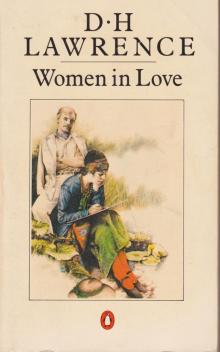 Women in Love
Women in Love The Ladybird
The Ladybird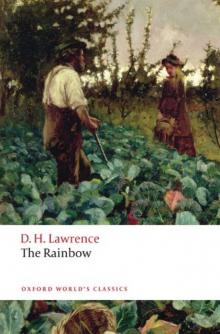 The Rainbow
The Rainbow The Captain's Dol
The Captain's Dol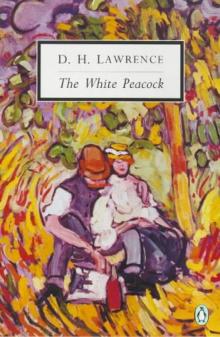 The White Peacock
The White Peacock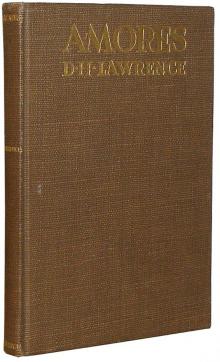 Amores
Amores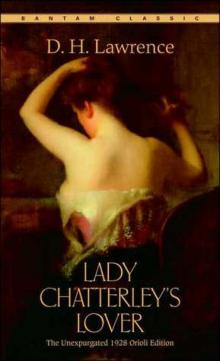 Lady Chatterley's Lover
Lady Chatterley's Lover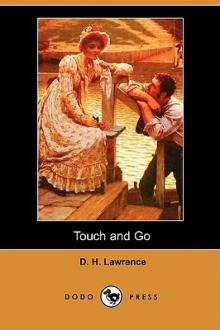 Touch and Go
Touch and Go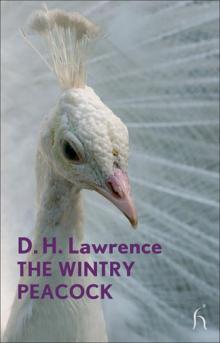 The Wintry Peacock
The Wintry Peacock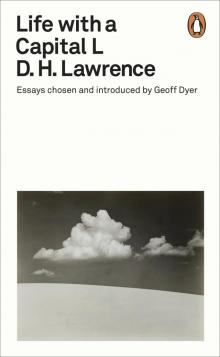 Life with a Capital L
Life with a Capital L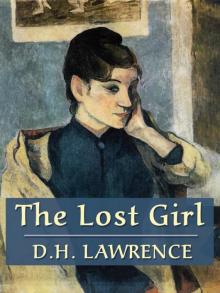 The Lost Girl
The Lost Girl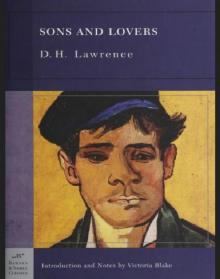 Sons and Lovers
Sons and Lovers England, My England
England, My England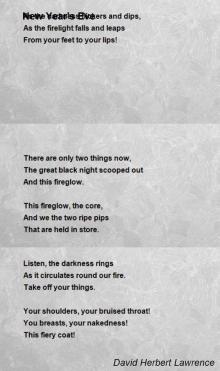 New Poems
New Poems Twilight in Italy
Twilight in Italy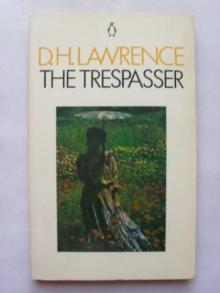 The Trespasser
The Trespasser The Collected Short Stories
The Collected Short Stories The First Lady Chatterley's Lover
The First Lady Chatterley's Lover Kangaroo
Kangaroo Bay
Bay Complete Works of D.H. Lawrence
Complete Works of D.H. Lawrence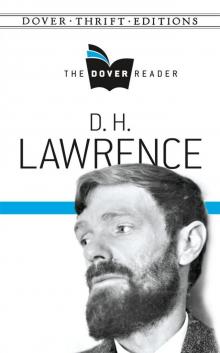 D H Lawrence- The Dover Reader
D H Lawrence- The Dover Reader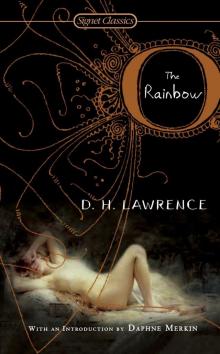 The Rainbow (100th Anniversary ed.)
The Rainbow (100th Anniversary ed.)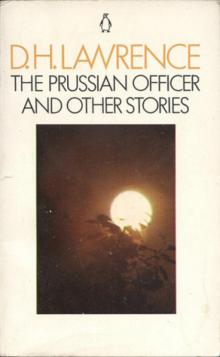 The Prussian Officer
The Prussian Officer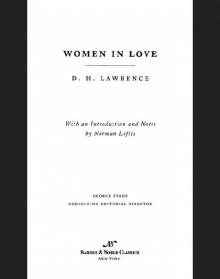 Women in Love (Barnes & Noble Classics Series)
Women in Love (Barnes & Noble Classics Series)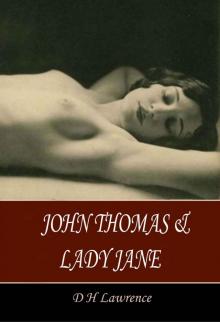 John Thomas and Lady Jane
John Thomas and Lady Jane The Bad Side of Books
The Bad Side of Books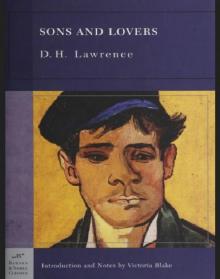 Sons and Lovers (Barnes & Noble Classics Series)
Sons and Lovers (Barnes & Noble Classics Series) Selected Stories
Selected Stories Collected Short Stories
Collected Short Stories Complete Works of D.H. Lawrence (Illustrated)
Complete Works of D.H. Lawrence (Illustrated)